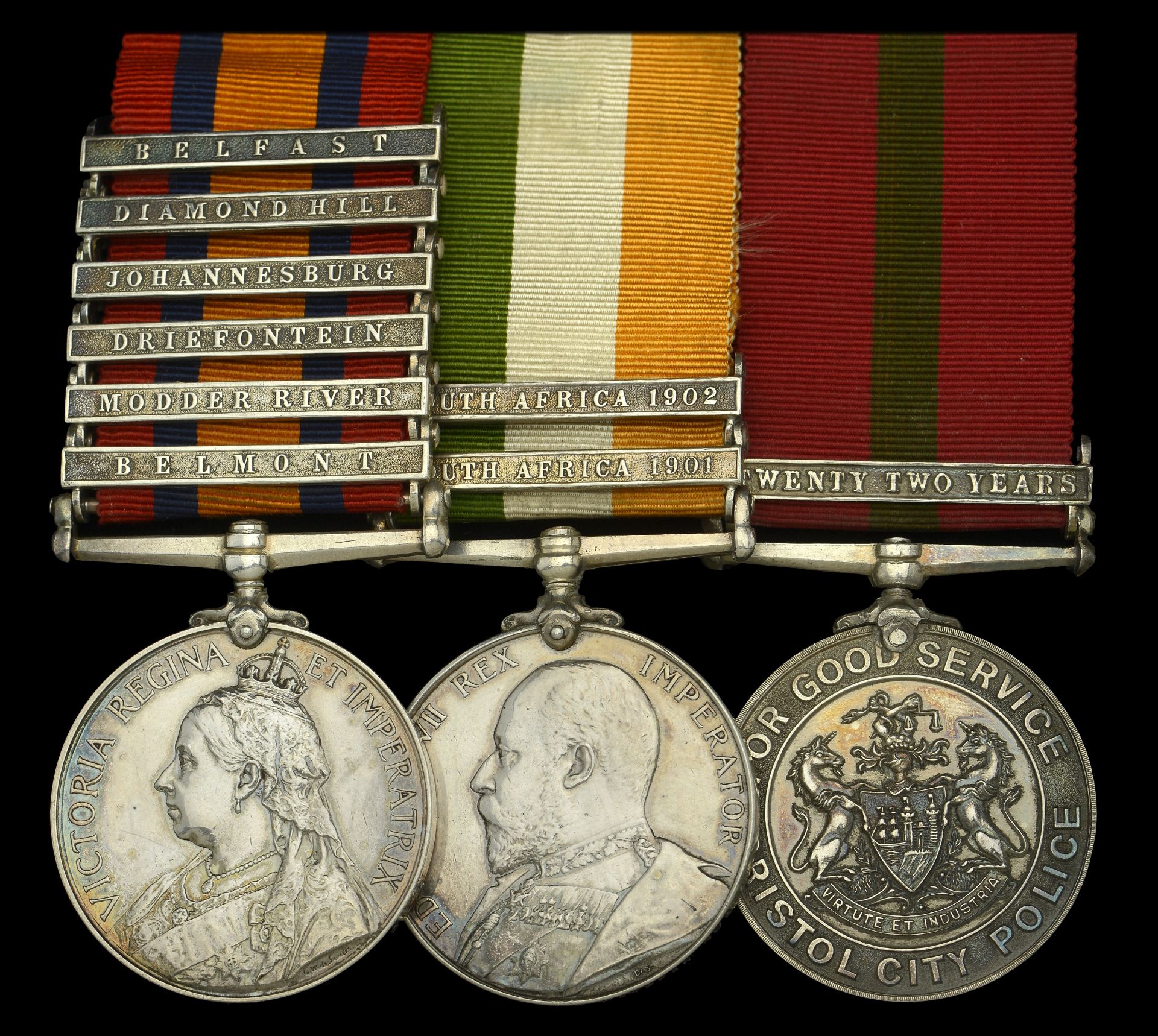A Welsh mining interest ‘Tonypandy Riots’, Boer War and Police Long Service group of three awarded to Police Constable Levi Wood, a Bristol policeman drafted in to help break the Cambrian Combine miners strike in the Rhondda coalfields in 1910-11, and who received back, head and hand injuries during the fighting in Llwynypia on 7 November 1910 Queen's South Africa 1899- 1902, 6 clasps, Belmont, Modder River, Driefontein, Johannesburg, Diamond Hill, Belfast (1318 Pte. L. Wood, Cldstm: Gds:); King's South Africa Medal, 2 clasps South Africa 1901, South Africa 1902 (1318 Pte. L. Wood. Coldstream Guards); Bristol City Police Long Service Medal, 1 clasp ‘Twenty Two Years’ (Con. L. Wood) this with top ribbon brooch, edge bruise to first, otherwise nearly very fine and better (3) £400-£500 --- Levi Wood was born to Charles and Louisa Wood, in Taunton, Somerset, early in 1880. By trade a gardener, he was already a member of the 2nd (Volunteer) Company of the Somerset Light Infantry when he enlisted into the 1st Bn. Coldstream Guards at Taunton on 5 January 1898. He was initially posted to London for training, subsequently remaining at home until posted to Gibraltar on 10 March 1899. On 27 October 1899, he was sent to South Africa to play his part in the Boer War. Returning home on 20 July 1902, he was, a week later, posted to the 3rd Battalion and on 9 October transferred to the Army Reserve on expiration of his period of army service. He was finally discharged from the reserve on 4 January 1910. Wood joined the Bristol City Police in 1905, while still on the Army Reserve, and in 1910 took part in the ‘Battle for the Glamorgan Colliery Powerhouse’ on Monday, 7 November. The ‘Tonypandy Riots’ as they were collectively known, were a series of violent confrontations between coal miners and police that took place at various locations in and around the Rhondda mines of the Cambrian Combine, a business network of mining companies formed to regulate prices and wages in South Wales in 1910 and 1911. The riots were the culmination of an industrial dispute between workers and the mine owners. The term "Tonypandy riot" initially applied to specific events on the evening of Tuesday, 8th November, 1910, when strikers, impassioned by extended hand-to-hand fighting with the Glamorgan Constabulary, reinforced by the Bristol City Constabulary, smashed windows of businesses in Tonypandy. The Bristol Police were the most hated of all the various police contingents as they were the most violent. A total of 1,499 Police were involved in suppressing the strikers, with 214 casualties being sustained by police contingents who needed medical attention. Minor casualties, numbering over 500, were not reported, nor were casualties amongst the minors. Constable Levi Wood was one of the casualties, sustaining injuries to his back, head and hand during the fighting in Llwynypia on 7 November 1910. This is confirmed in the book ‘Labour Strife in the South Wales Coalfield 1910-1911’ by David Evans, published Cardiff, 1911. Home Secretary Winston Churchill's decision to allow troops to be sent to the area to reinforce the police shortly after the 8 November riot caused ill-feeling towards him in South Wales throughout his life. His responsibility remains a strongly disputed topic. Strangely enough there was little, if any, ill-feeling towards the troops, who were mostly covertly sympathetic to the miners and got on very well with the local population. There have always been local stories of how the soldiers looked elsewhere when the out of work miners were scavenging coal from the spoil heaps to try to keep their families warm and to cook what little food they had. There was also the story of the loaded coal train which left the valley for Barry Dock which arrived at its destination virtually empty. The soldiers guarding it stating that it must have departed that way, or was secretly pilfered when they were not looking! Wood was awarded his Bristol City Police Long Service Medal with clasp “Twenty Years” in 1927, at the age of 47, and died in Bristol in December 1941, aged 61. Wood’s police service record is held in Bristol archives. Sold with Coldstream Guards service papers, a reprint (1963) copy of ‘Labour Strife in the South Wales Coalfield 1910-11’, which lists all the police participants and their injuries, and ‘The Tonypandy Riots 1910-11’, by Gwyn Evans & David Maddox (2010) which tells the full story of the strike and aftermath with many illustrations.



